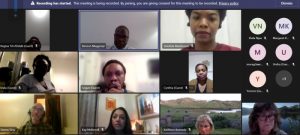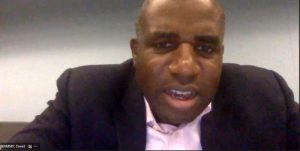
Aberdeenshire’s celebration of Black History Month was an inspiring event, which heard from two speakers with very different life experiences, but both bringing their authentic voices to the discussion and both committed to challenging the scourge of racism.
Kay McKerrill, branch secretary and equalities officer for Orkney Council branch and a solicitor to trade, told of her experience growing up as the much loved adopted daughter of a wealthy white couple. She explained that throughout her life she had been privileged not to experience racism but to be accepted, respected and valued in her family and the communities in which she has lived and worked.

Reflecting on what she has to offer, Kay said, “I realise that because I have not experienced discrimination on a personal level, I have the energy to challenge racism and to use my knowledge and skills to fight on behalf of others.”
She added, “I have come to realise that I do feel I play my part in the rich fabric of our country’s diversity.
“I may not be the ‘triumphing over adversity’ inspiration and role model, I may not be the ‘high-profile activist’ challenging leaders on the front pages.
“But, we do not all need to be the grand embellishment of the design.
“I do what I do, because I believe it is work worth doing. And where others have led the way, but no longer have the time or the energy, I offer my time and my energy, to help keep the momentum going.
“Some people enrich everything by slowly but surely strengthening the base fabric. Helping others weave their own pattern and challenging those who would try and diminish the colourful contributions of others,” added Kay, urging all Black members to get involved in their branch and in the Scottish Black members organisation.

David Lammy MP spoke of his childhood growing up poor and black in Tottenham. Raised by a single parent mum, a nurse who came over with the Windrush generation, and a member of NUPE, David praised the union for giving his mum access to the training that helped put food on their table. He is a UNISON member himself.
In response to questions from the audience, he spoke of the fatigue that many feel after years of fighting against racism. “The problem is not blackness,” said David, “It’s whiteness.”
Initially sceptical after the murder of George Floyd that anything would change, “because we’ve seen it all before, including in the UK,” the involvement of young people, white and black in the Black Lives Matters movement made him feel that something is starting to happen, “despite this government.”
However although heartened by resistance to this UK Tory government and their attempts to weaponise race, he does see there is much to do to tackle endemic racism in our society.
He referenced the appalling treatment of the Windrush generation, the terrible tragedy of Grenfell where so many black lives were lost, and the COVID pandemic, which disproportionately affected black and ethnic minority workers, who were on the front-line of the pandemic.
He called for a new Race Relations Act which the Labour Party would introduce if in power.
David spoke of the important role of white allies, “to call out racism in the workplace and also to step back and not make assumptions.” Growing up he faced many barriers throughout his childhood and was able to overcome them with the help of allies and mentors who were not the same colour as him.
“It’s important to know your history, know where you’ve been and know where you’re going so you can stand firm on the ground, said David, adding that when times are tough, you know there is always someone in your ancestry that’s had it tougher than you but got through it so that future generations would have a better life.
He added that he has always tried to be authentic in politics and has done his best to hold on to that authenticity.
Reflecting on the struggle ahead he warned that the structures of racism took hundreds of years to build. “At its heart is power,” said David. “It’s a struggle but with each generation it gets better – it will come.”
